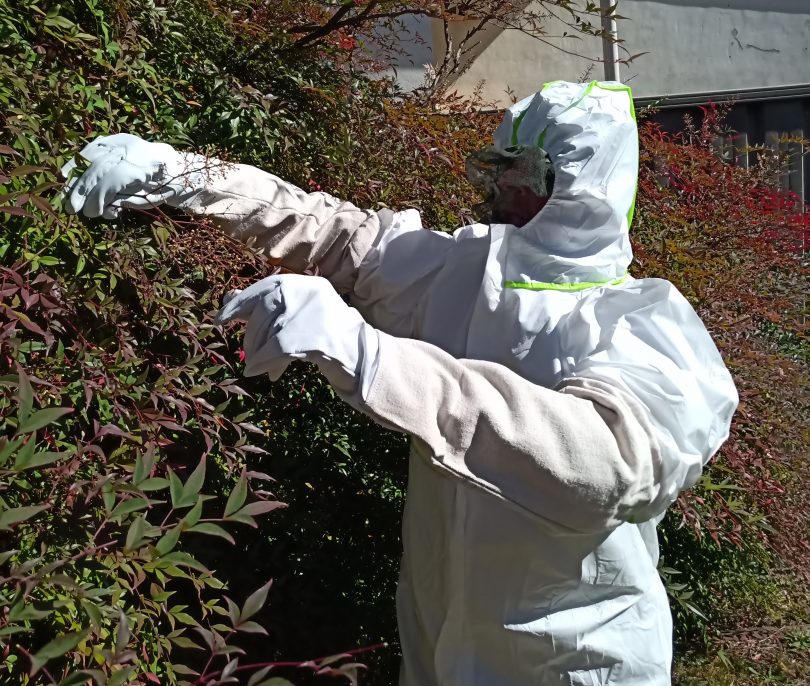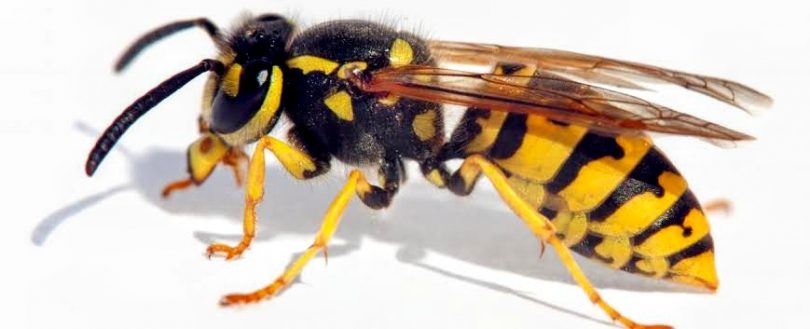
Horticulturalist Steve Carr setting a wasp trap in Bungendore. Photo: Eurowasp.
Highly aggressive European wasps are on the move, and they’re bound for Braidwood and Bungendore.
Traps have been installed at Braidwood Central School, Braidwood Community Garden, Bicentennial Park and Braidwood Recreation Grounds following reports of European wasp nests in the town.
The traps will be monitored and serviced every three weeks through to the end of the European wasp season in 2022.
Michael Squires from Eurowasp says ‘hot spots’ have been identified in Braidwood thanks to reports from residents, mainly via the organisation’s Facebook page.
“The alerts are appearing on my screen like popcorn,” he says.
As the spring and summer season unfolds, Michael says more wasps are likely to appear, posing a risk to humans, horticultural crops and bees in managed apiaries.
While a series of ecofriendly traps that do not harm bees have been set in Braidwood, Michael says nearby Bungendore is “lacking a plan” to manage European wasps.
READ ALSO: Goulburn’s mystery drive ready to roll on for sick kids
“In Bungendore, as with Braidwood, we have great concerns about the creek systems, specifically Turallo Creek and Mill Post Creek which are usually prime breeding grounds for European wasps,” he says.
“What we have here at the start of the European wasp season is good reason to predict that Bungendore will have serious problems with these wasps as temperatures increase.
“It is quite possible that Bungendore will have as serious a problem as Braidwood had before we entered the battle in April 2021.”
Michael says Bungendore is predicted to have a very bad year for one specific reason.
“Nothing was done last year to manage these invaders and, more precisely, nothing was done during the pre-hibernation months of April, May and June when the queens were looking for new mates and nests,” he says.
“Since last week when we started asking people to send in sighting reports, we have had 43 sightings from just about all over Bungendore.”
Michael has asked people to keep reporting sightings as he builds a pattern of wasp behaviour on his maps, which will allow traps to be deployed in the most optimal locations.

The dangerous European wasp is setting up camp in Braidwood and Bungendore. Photo: Whitehorse City Council.
Common sense practices, such as not leaving food around and never drinking from a can, will reduce the chance of being stung, however Michael says it will not reduce the number of European wasps he is expecting to see this year.
“This invasive species needs to be eradicated from your region and all of Australia,” he says.
“Their populations are growing at an extraordinary rate. The damage they are doing and the health hazard they represent has only just begun.”
Michael warns people should leave wasps alone as they will often attack if provoked.
READ ALSO: Alina Piloiu preserves a life she was forced to leave behind
Unlike a bee, which can only sting once – and leaves the stinger behind in the skin – the European wasp can sting repeatedly. It also emits a pheromone that alerts other European wasps to attack.
Stings can cause severe pain and allergic reactions, especially in children.
According to the Better Health Channel, you should seek urgent medical attention if a child is stung more than five times, an adult is stung more than 10 times, or anyone is stung in the mouth or throat, as swelling in these areas can block airways.







